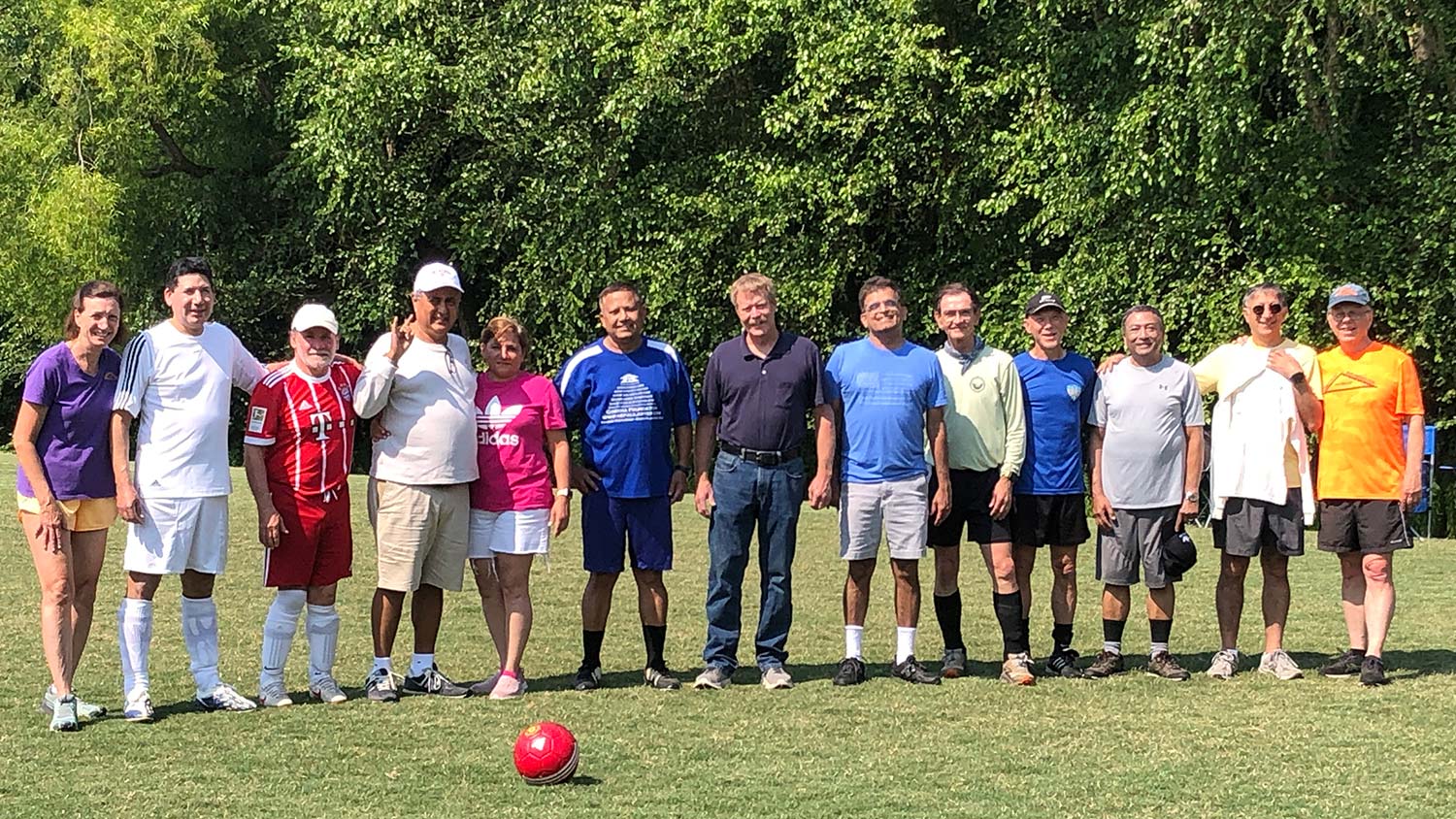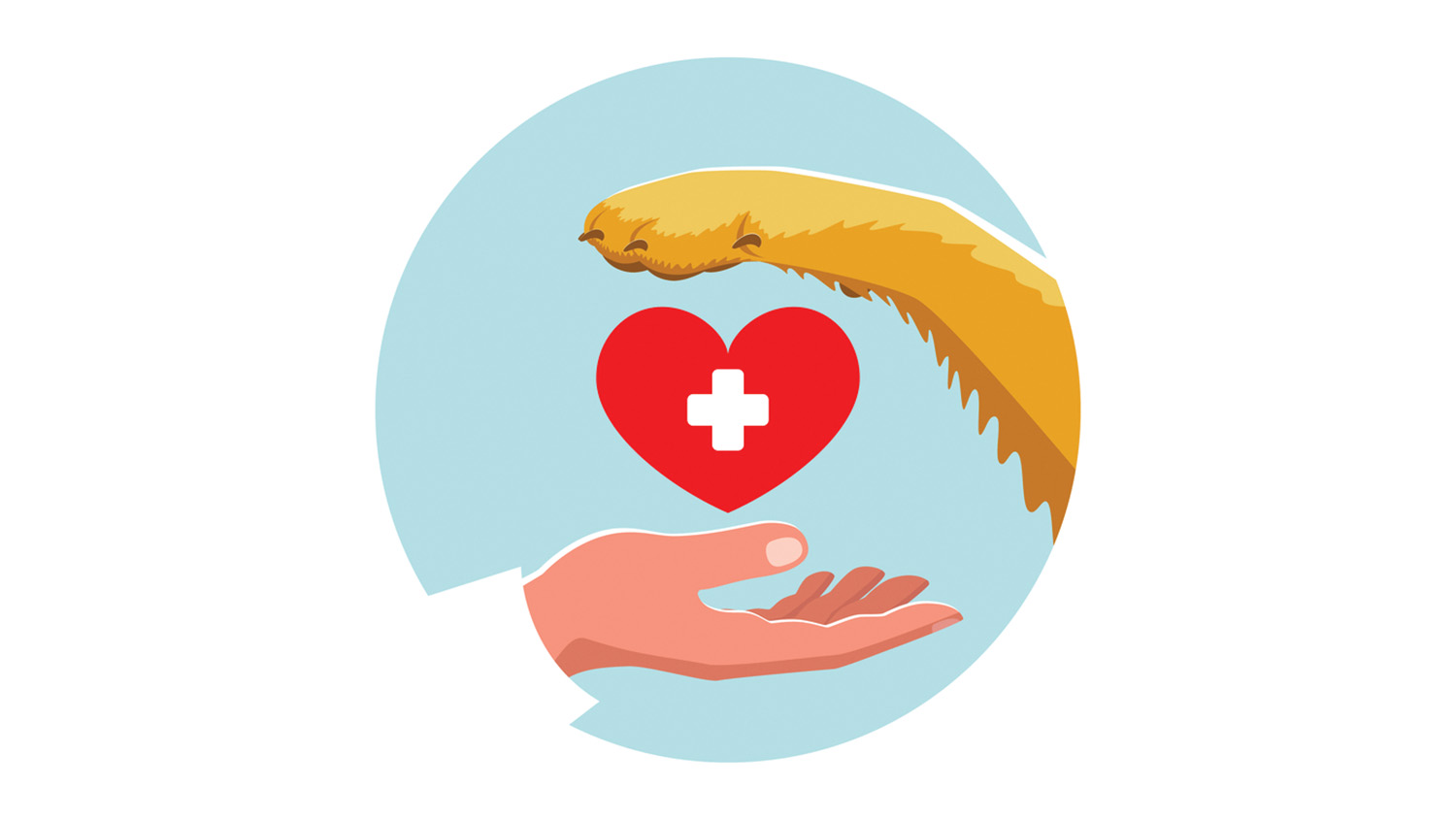Hanging Their Hopes on Russell
Russell Wilson '10 means more to Seattle than a Super Bowl victory.
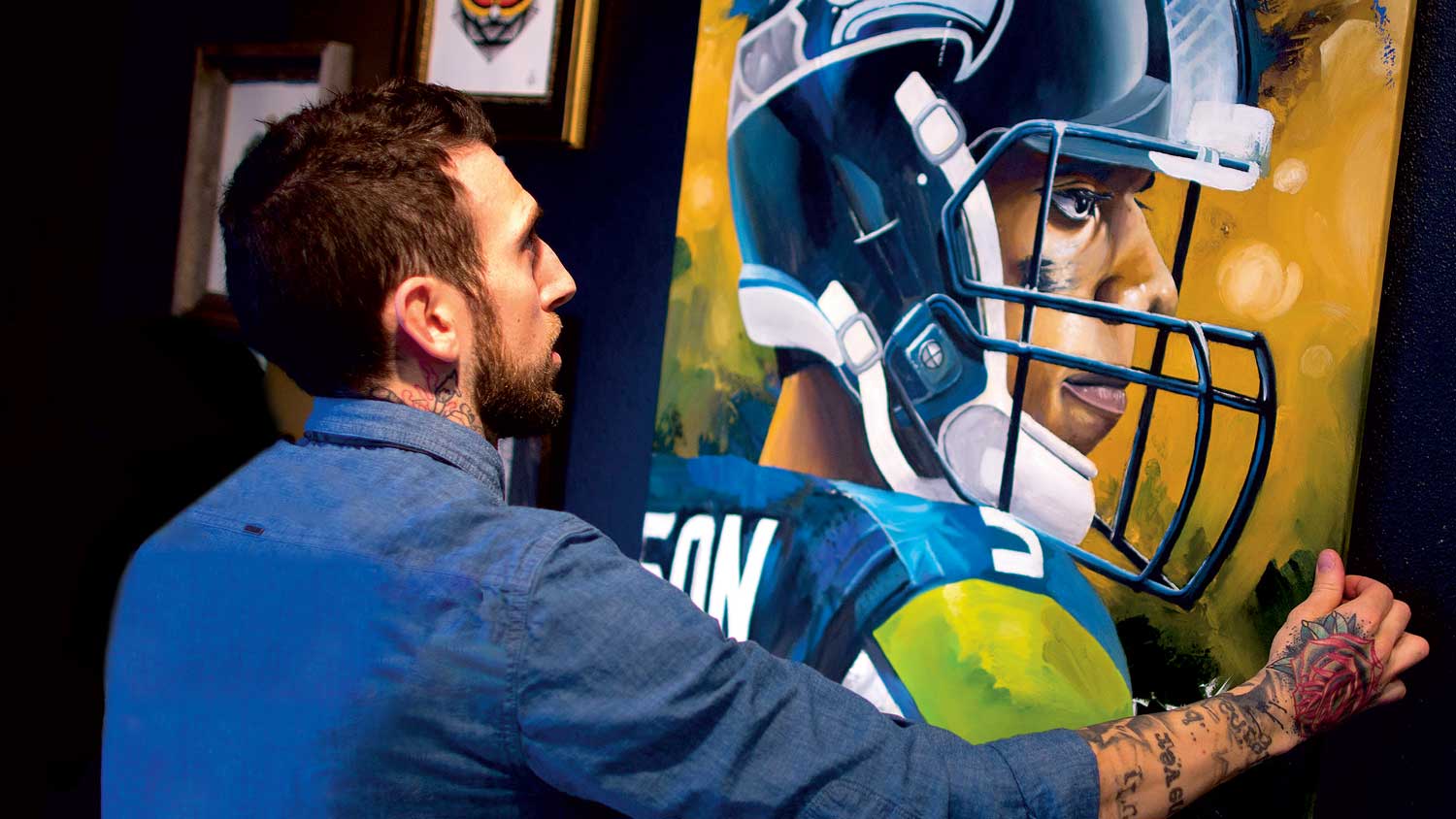
SEATTLE, Wash.—A couple of days after Russell Wilson ’10 led the Seattle Seahawks to their first Super Bowl title in early February, ESPN’s popular radio show Mike & Mike in the Morning has already turned the page. Co-host Mike Golic is talking about the upcoming NFL draft, asking which college player might slip to a later round but still make an immediate impact as a professional. Who, Golic wonders, can be the next Russell Wilson?
Though Golic’s question is about what happens on the field, people in Seattle will tell you there’s nobody like Wilson, period. You hear that sentiment inside the deafening CenturyLink Field, where the Seahawks play home games, as 68,000 Seattle fans known collectively as “The 12th Man” chant, “WIIIIIIIIIIIIIIIIIIIIIILSOOOOOOOOOOOON,” when he’s introduced to a song sharing the same name by jam band Phish. Or when you talk to people around town like Anders Miller, who throws chum salmon for show at the Pike Place Market and likes the fact that Wilson is always studying when a camera pans to him on the sideline during games. People like Dave and Kristina Quick who have spent time with Wilson in Seattle Children’s Hospital as he checked on their baby son Franklin. Or people like Andra Addison, the communications director for the Seattle Public Library, a vortex of steel and glass puncturing the skyline at unusual angles. Last season, the library decided to show Seahawks playoff games on the big screen in the Microsoft Auditorium for the first time since 1995. “[Wilson] is very much engaged in the community,” Addison says. “He gave the city hope.”
When you mention Seattle, the first thing someone’s going to say is ‘Russell Wilson.’ He’s adopted our city in a way no other player can. —Nathan Mark
Since being drafted by the Seahawks in the third round in 2012, Wilson has tied Peyton Manning’s record for the most touchdown passes (26) by a rookie and became the first NFL rookie quarterback to lead a team to an undefeated record at home. He is making his case to be on Seattle’s Mount Rushmore of sports figures by delivering the Vince Lombardi Trophy to Seattle, a city that had been known for its sports mediocrity. And the icing on the cake to Seattleites is Wilson’s investment in the community.
“Not only is he captain of the team, he’s captain of our city,” says Nathan Mark, a 34-year-old doorman who sports a white Wilson jersey on days he checks IDs outside The Central, a bar in Seattle’s Pioneer Square district a couple of blocks from Century Link Field. “When you mention Seattle, the first thing someone’s going to say is ‘Russell Wilson.’ He’s adopted our city in a way no other player can.”
That may be because Wilson sees football as only part of what he has to offer the city. In a February interview, PBS’s Charlie Rose asked Wilson how a player should be judged. Is it the yards and touchdowns he compiles in a career? Is it the number of Super Bowls he wins? “By the way they affect people,” Wilson said. “By the way they affect the organization. You think about Peyton Manning and how he’s affected the Indianapolis Colts for so long. That’s what you want in a quarterback. That’s what you want in terms of the face of your franchise. A person that can change the community and change the city….”
That approach resonates with Dustin Bogue, a 29-year-old tattoo artist. His studio is about 15 minutes north of Seattle in a strip mall where you can get donuts, takeout from Bento Teriyaki or a beer at O’Houlies Pub. He enjoys his tattoo work, which he’s been doing for 10 years, and can ink anything, including the 12th Man tattoos he offered for $12 during the Seahawks’ playoff run. Recently, Bogue expanded his artistic endeavors, painting oil portraits on canvas.
By painting portraits of people synonymous with Seattle, Bogue says, he can help people see the virtues of the city. For his first effort, Bogue painted Russell Wilson in a portrait titled “NoTime2Sleep,” a Wilson mantra. Bogue says he chose the quarterback for his first portrait because of the kinship he feels with the football star. “It’s the influence he’s had,” Bogue says. “I’m just trying to be an influence with what I’m doing. I want to stick to the positive.”
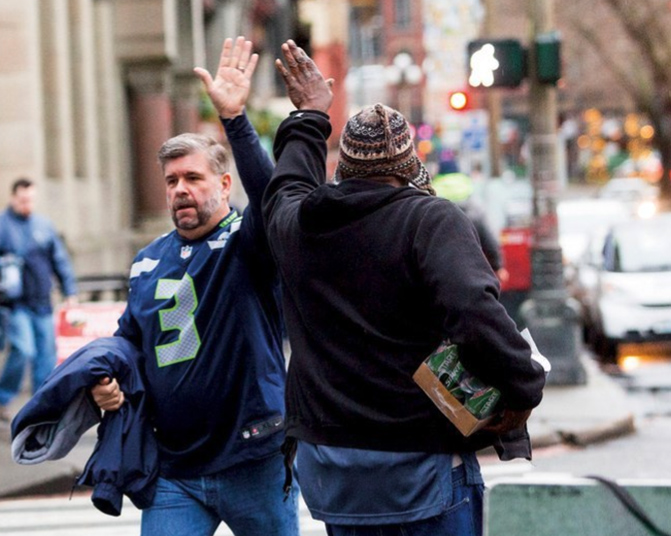
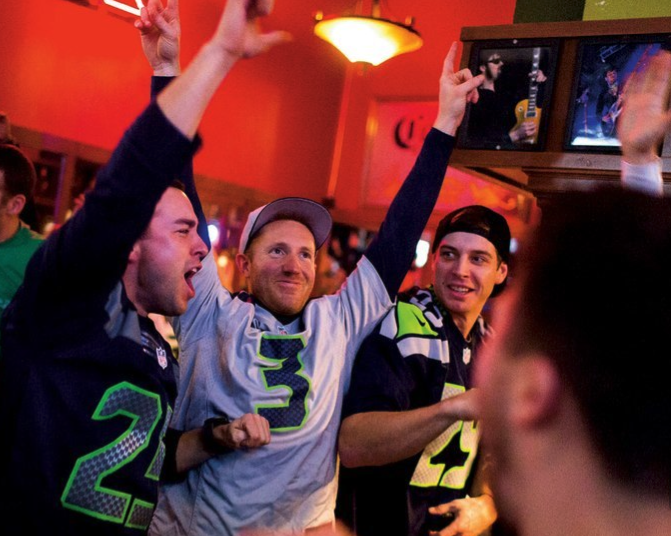
Wilson has become, in a sense, everyone’s best friend, and it’s apparent when people refer to him as “Russell”—not “Wilson” or “our quarterback.” They see Wilson as a regular guy, someone they can imagine having over for dinner. He’s a canvas on which they can project their own story, not unlike what Bogue is doing with an actual canvas. Jason Prall, a 33-year-old Seattle engineer, relates to Wilson when he recalls his own experience playing football as a wide receiver at Western Washington and transferring to play shortstop for Gonzaga’s baseball team. Jamie Santillan is a graphic designer who eats at the same Indian restaurant in Pioneer Square before every Seahawks home game, always wearing Wilson’s No. 3 jersey. He lauds Wilson’s success in the face of experts saying he was too short, at 5-foot-11, to be an NFL quarterback. Santillan says that, like Wilson, he is a short and humble guy.
In January, Wilson’s presence is on display throughout the city and excitement is in the air as the Seahawks prepare for a divisional playoff game with the New Orleans Saints. His jersey is the top seller at the Seahawks apparel shop downtown and at Seattle Shirt Company, a bustling gift shop across from the Pike Place Market. There, Wilson’s is the only jersey sold in kids’, men’s and women’s sizes. T-shirts with his image in front of a silhouetted Seattle Space Needle and the words “We Believe” hang in the windows of Bar- tell Drugs. He graces the cover of Seattle Weekly for a story called “The Seahawks Effect.” A trendy bar in Seattle’s Capitol Hill district serves a blue drink called “Russellmania.”
On a typically overcast Friday morning before the Saints game, you’ll find supporters who feel a kinship with Wilson that surpasses simple fandom. Yes, there is a medley of 12th men at an early morning pep rally, from a man who has the Seahawk logo shaven and painted into his hair to a couple getting married outside of sections 135 – 137 while other fans look on and cheer. The bride promises the groom never to be a fair-weather fan. The backdrop is a large mural of Wilson in mid-scramble, seemingly blessing the union before he throws another pass.
Trying to make her way through the crowd inside of CenturyLink is Gemini Kelly, a 37-year-old entrepreneur who is proudly wearing a white Wilson jersey and holding hands with her 15-month-old grandson, Daiveon. She speaks of the quarterback in a tone that sounds more like she is defending her vote for a candidate in a presidential primary. “He has leadership qualities,” she says, adding that his charity work is emblematic of Seattle. “The generosity is definitely there.” Seattle is a place where “you can see some- body walk out and take muffins to a homeless person. We pay it forward.”
A few feet away, 26-year-old Carlos Salas stands in the crowd with a duffel bag filled with sweatshirts he sells for $25. They bear the design of the hoodie he wears, a lime green screenprint of Wilson’s face with the words: “In Russ We Trust.” Salas, who is also known as Cha$ten Tha Don, is emphatic that the font he chose for the shirt is the same as that used on the dollar bill. Why? “He’s our money,” Salas says of Wilson. “He’s money for us.”
Salas is also a young rapper from Lakewood, Wash., 40 miles south of Seattle. He equates his efforts to establish a career with Wilson’s uphill climb to be Seattle’s starter. “People didn’t believe in him,” Salas says. “And people didn’t believe in me with my music. He was drafted late. He was an underdog. He started at the bottom.”
That underdog status is something celebrated by Wilson’s fans. Initially, Wilson was an afterthought for many fans since the Seahawks had just invested millions in free-agent quarterback Matt Flynn. But Wilson impressed coaches and teammates early in camp. “He came in his rookie year and had pretty terrific command of the huddle,” says Max Unger, center for the Seahawks. “You don’t expect that of a rookie, being able to step in with veteran NFL players and command the huddle. The physical skills showed up, too. He physically and mentally won the job.”
He came in his rookie year and had pretty terrific command of the huddle. You don’t expect that of a rookie, being able to step in with veteran NFL players and command the huddle. The physical skills showed up, too. He physically and mentally won the job. —Max Unger, Center for the Seattle Seahawks
He’s been winning in the NFL ever since, by knowing when to rely on Marshawn Lynch, one of the NFL’s top running backs, or on a top-shelf NFL defense. He realizes he doesn’t have to be perfect, that he can slide or run out of bounds instead of fighting for an extra yard or throwing an interception. Such attributes could produce a lengthy NFL career for Wilson. “It’s one thing to have success the first year,” Unger says. “It’s another to do it over and over. You can tell he’s consistent. That’s how you measure a professional athlete—how long can you do things right.”
Across town from CenturyLink Field, Wilson has been doing things right for three years at Seattle Children’s Hospital, visiting sick children and their families every Tuesday. The visits began when he called the hospital after he was drafted and asked if he could have a standing weekly appointment to visit. Eve Kopp, director of corporate annual giving at Seattle Children’s, says hospital officials had never had an athlete ask for so much time at the hospital, and some don’t treat it as a serious cause. Wilson kept coming back and asking to meet more children. “We call him our 12th man,” she says. “It’s as if he gets something out of it. It almost energizes him the more families he meets. People want to touch him and hug him. It’s almost like he wants to touch them and hug them because they are his inspiration.”
Dave Quick is a 34-year-old Brier, Wash., electrical salesman and father to twins Harrison and Franklin. Both were born prematurely in October 2013. Harrison was fine, but Franklin had complications. Doctors told Quick they would have to do immediate surgery to help Franklin get rid of his waste and then perform open heart surgery days later. “When he came back, they left his chest open,” Quick says. “He had chest tubes. He was on 13 different medicines. He just looked so fragile.”
Quick felt helpless and alone and couldn’t sleep. Dave’s wife, Kristina, soon joined him with Harrison at Seattle Children’s, and Franklin showed signs that he would fight. Then, on their second week there, they got a visit. Wilson walked into their room and introduced himself. He asked if he could pray for Franklin and visited for a couple of minutes. It was a simple escape for the Quick family, but one that Dave Quick says helped them cross a critical threshold.
“I teared up a little bit just because we had such an emotional tough start. He freed us up to just kind of let it all go,” Quick says.
“In no way, shape or form do I claim to be friends with Russell Wilson. But that feeling he left us with that day was this calm aura.”
There are dozens of stories like the one told by Quick, who adds that Franklin, after subsequent procedures, is eating, healthy and growing normally. Wilson has said his visits are a result of time he spent with his father, Harrison, in hospitals before the elder Wilson died due to complications from diabetes in 2010. “When I came to Seattle that was one of the first things I tried to figure out, besides figuring out where I was going to live,” he said in a January press conference. “. . .I think that to be able to find a way to change people’s lives and to be there and give them a boost is really important to me. They don’t realize how much they’ve affected me. Every time I see a kid smile, it really just opens up my heart and means a lot to me.”
Wilson’s ability to connect with others was in him before he landed on the West Coast. It was evident in Raleigh when, in 2008, he became the first freshman in league history to be named an All-ACC first-team quarterback and in Madison, Wis., where he was named co-captain of the University of Wisconsin football team two months after transferring there. “He captivates people,” says Annabelle Myers, NC State’s assistant athletics director for communications. “He just has this aura about him.” It was a trait that was even evident in high school, when Wilson starred in basketball, football and baseball at Collegiate School in Richmond, Va. Charlie McFall, former head football coach at Collegiate, had a name for the phenomenon.
“‘The Russell Factor’ is carried on to this day at Collegiate,” McFall says. “As he became who he was, younger kids and middle-school kids wanted to play football because of Russell. One day I went into the cafeteria. There must have been 50 people up on the stage. I couldn’t tell what was going on. Then I look up and see Russell and his buddy were up there and he was signing autographs.”
McFall believes that influence will inevitably transcend Seattle, Madison, Raleigh and Richmond. “He’s going to be the face of NFL football soon,” McFall said in early March. Two months later, after interviews with David Letterman and Charlie Rose, as well serving as a spokesman for Microsoft’s Surface in a national advertising campaign, Wilson helped open ESPN’s primetime coverage of the 2014 NFL Draft.
Dave Quick knows some people might think Wilson is too good to be true. But Quick has seen Wilson pray for his son. He has talked to Wilson about their shared connections to the St. Louis Cardinals — Dave is a lifelong fan, and Wilson is a friend of Cardinals’ left fielder Matt Holliday. And he’s talked to Wilson about how Franklin’s twin, Harrison, shares the name of Wilson’s father. He says Wilson is the real deal. And maybe that’s his most extraordinary talent—just being normal.
“Russell Wilson relates to a broader spectrum of people. People can relate to him more than a lot of other guys,” Quick says. “I think it’s the way he approaches his community. It’s almost like Seattle was waiting for him. He’s what the city has been waiting for.”
- Categories:
